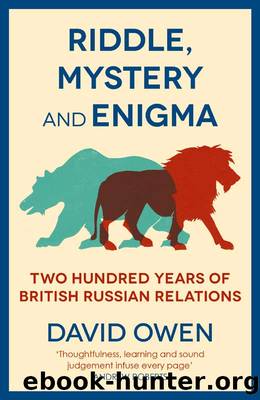Riddle, Mystery, and Enigma by David Owen

Author:David Owen
Language: eng
Format: epub
ISBN: 9781913368395
Publisher: Haus Publishing
Published: 2021-06-15T00:00:00+00:00
7
Russia on the Road to Reform
While the Brezhnev era was generally seen as the age of stagnation, one of the key figures to emerge from that period, Yuri Andropov, was to play a critical role in the momentous changes that followed. A hard-liner in many ways, Andropov was a man of extraordinary influence, brimming with ideas and involved in a broad range of decisions on ideological and other issues from the moment he became head of the KGB in 1967. Moreover, unlike his short tenure at the very pinnacle of the Soviet system as general secretary, his legacy was long-lasting; Gorbachev took a great deal of inspiration from him. His influence can also be seen today in the career of President Putin.
The longest-serving KGB chief, Andropov was not corrupt. He ran it largely unchecked for fifteen years and built it into the most influential organisation in the USSR, particularly in strengthening its activities against internal dissidents. Andropov was well positioned when the Communist Partyâs second secretary, Mikhail Suslov, died in 1982. As mentioned in Chapter 6, he had worked with Suslov during the crushing of the Hungarian rising and gone on to serve under him as head of the Foreign (Socialist) Department of the Central Committee from 1959 to 1967. Andropov had âacquired the reputation within the Party of being a strong but just man, the guardian of the system. He, Suslov and [minister of defence, Marshal Dmitry] Ustinov were the only Politburo members known to be modest in their personal lifestyle.â1 Brezhnevâs choice for Suslovâs successor had been his former personal assistant Konstantin Chernenko, but he soon found there was no support for this move. Gromyko and Ustinov were against Chernenko, and Brezhnev was unable to prevent Andropovâs appointment as his number two in the party hierarchy. The background to this man is, therefore, of considerable interest.
Like his protégé Gorbachev, Andropov was a son of Stavropol. His father was a Cossack, his mother, Evgenia Fainshtein, Jewish.2 By the time he became general secretary of the CPSU, he was a widower with two children. His daughter was married to an actor at the avant garde Taganka Theatre, and she worked for the magazine Theatre. His son was a delegate to the follow-up conference of the Conference on Security and Cooperation in Europe in Madrid. Andropov spoke English, had tried to teach himself German as a youngster, and was an avid reader; books by Montaigne and Machiavelli were seen on his desk. He did not go to university, but his higher education might have been at the special KGB academy. In later life, he liked the music of Yuri Vizbor and Vladimir Vysotsky, whose songs were often politically incorrect and suspect in the eyes of the ideological guardian but which circulated on tapes hand to hand. According to Gorbachevâs biographer, William Taubman, Gorbachev and his wife would sing these together with Andropov.3
Andropov had been acutely aware for years that old-fashioned Soviet propaganda was becoming counterproductive and that the nature of the Soviet economy was leading to its persistent economic decline.
Download
This site does not store any files on its server. We only index and link to content provided by other sites. Please contact the content providers to delete copyright contents if any and email us, we'll remove relevant links or contents immediately.
Hongkongers in the British Armed Forces, 1860â1997 by Chi Man Kwong(69)
Riddle, Mystery, and Enigma by David Owen(69)
Enlightenment and Political Fiction by Cecilia Miller(66)
Tore Godal and the Evolution of Global Health (Routledge Studies in the History of Science, Technology and Medicine) by Conrad Keating(38)
Popularizing National Pasts : 1800 to the Present by Stefan Berger; Chris Lorenz; Billie Melman(37)
Empires to Be Remembered: Ancient Worlds Through Modern Times by Michael Gehler; Robert Rollinger(28)
Empires to be remembered by Michael Gehler Robert Rollinger(27)
